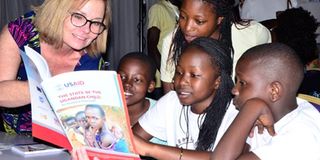Private sector asked to support child welfare programmes

USAID mission Director, Leslie Reed shares a light moment with some of the children who attended the High Level Dialogue on partnership to improve the state of the Ugandan Child. PHOTO BY ALEX ESAGALA
What you need to know:
Early pregnancies, child marriage and malnutrition are the main problems facing children in Uganda.
Kampala. United States Agency for International Development (Usaid)has asked the private sector to support child well-being programmes in the country through partnerships.
According to a report launched on Monday, the health status of children remains poor with one in every three children stunted due to malnutrition.
The report dubbed: “State of Ugandan Child: An analytical overview,” also indicates that enrolment of children in pre-primary remains very low due to the limited availability of pre-primary schools, particularly in rural communities.
Usaid mission director Leslie Reed observed that 96 per cent of children in Uganda are considered vulnerable.
“If we are to see change, transformation, and Uganda develop to attain Vision 2040, we are all going to have to work together to change the state of the Ugandan child,” Ms Reed said at a high-level partner dialogue held in Kampala.
“You have heard that one in every four girls don’t complete primary school because of early pregnancy; we have too many child marriages and three quarters of children are stunted. This means that they are not only short but their brains are also not fully developed,” Ms Read observed.
Ms Reed called on private sector to invest in child welfare programmes in order to address the critical challenges facing Ugandan children.
While officiating at the opening ceremony of the event, the permanent secretary to the Ministry of Gender, Mr Pius Birgirimana, said the dialogue is important because development is not only a mandate of government but also its stakeholders.
“We are already working with the Private Sector to develop a Public Private Partner Policy on investing in children and the child protection working group,” Mr Birgirimana said.
On behalf of the Private Sector Foundation Uganda (PSFU) chairman, Ms Ida Wanendeya, an adviser to the foundation, said if the private sector is to have maximum productivity from their employees, they must promote the well-being of children in their early years.
“In order for the private sector to compete locally, regionally and internationally, we have to improve on productivity and skills,” Ms Wanendeya said, adding that children need to be taught the right attitude towards work at an early stage.
Mr Everest Kayondo, the Kampala City Traders Association chairman, said they are concerned about the high rate of school dropout at both primary and secondary levels, based on the fact that these children are their future consumers.
“We need to understand the reasons why pupils are dropping out of school to be able to get solutions,” Mr Kayondo said.
Mr Mohammed Omar, the chief executive of Toyota Uganda, said they are currently implementing an early literacy programme in 13 primary schools by supplying reading materials, teaching children about road safety and rugby as a sport.




